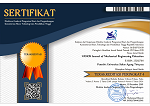IMPLEMENTATION OF PROJECT BASED LEARNING MODEL FOR IMPROVING STUDENTS LEARNING OUTCOMES OF ADVANCED MACHINING ENGINEERING IN UNIVERSITAS SARJANAWIYATA TAMANSISWA
Abstract
Keywords
Full Text:
PDFReferences
Bell, Stephanie. (2010). Project Based Learning for the 21st Century: Skill for the future[versi elektronik]. The Clearing House, 83: 39–43. Taylor & Francis Group, LLC, DOI: 10.1080/00098650903505415. Jakarta.
__________(2012). Project Base Learning. Kementerian Pendidikan Nasional.
Kemdikbub. (2013). Materi Pelatihan Guru Implementasi Kurikulum 2013. BPSDMPK dan PMP.
Mohamad Ansori. (2007). Penelitian Tindakan Kelas. Bandung: Wacana Prima.
Ngalim Purwanto. (2002). Prinsip-prinsip dan teknik evaluasi pengajaran. Bandung: PT. Remaja Rosdakarya.
Okudan. Gul E. dan Sarah E. Rzasa. 2004. A Project-Based Approach to Entreprenurial Leadership Education. Journal Technovation. Desember. Volume XX. Page 1-16.
Purwadarminta, (1989). Kamus Umum Bahasa Indonesia. Jakarta: Balai Pustaka. Suharsimi.
Arikunto, 2002. Prosedur Penelitian. Jakarta: Rineka Cipta.
Rochiati Wiriatmadja. (2006). Metode Penelitian Tindakan Kelas untuk Meningkatkan Kinerja Guru dan Dosen. Bandung: Remaja Rosdakarya.
Santyasa, I W. (2006). Pembelajaran Inovatif: Model Kolaboratif, Basis Proyek, Dan Orientasi NOS. Makalah. Disajikan Dalam Seminar Di Sekolah Menengah Atas (SMA) Negeri 2 Di Semarapura.
Wena, Made. (2011). Strategi Pembelajaran Inovatif. Jakarta: PT. Bumi Aksara.
DOI: http://dx.doi.org/10.30870/vanos.v2i1.1963
Refbacks
- There are currently no refbacks.

This work is licensed under a Creative Commons Attribution 4.0 International License.


.png)
.png)
